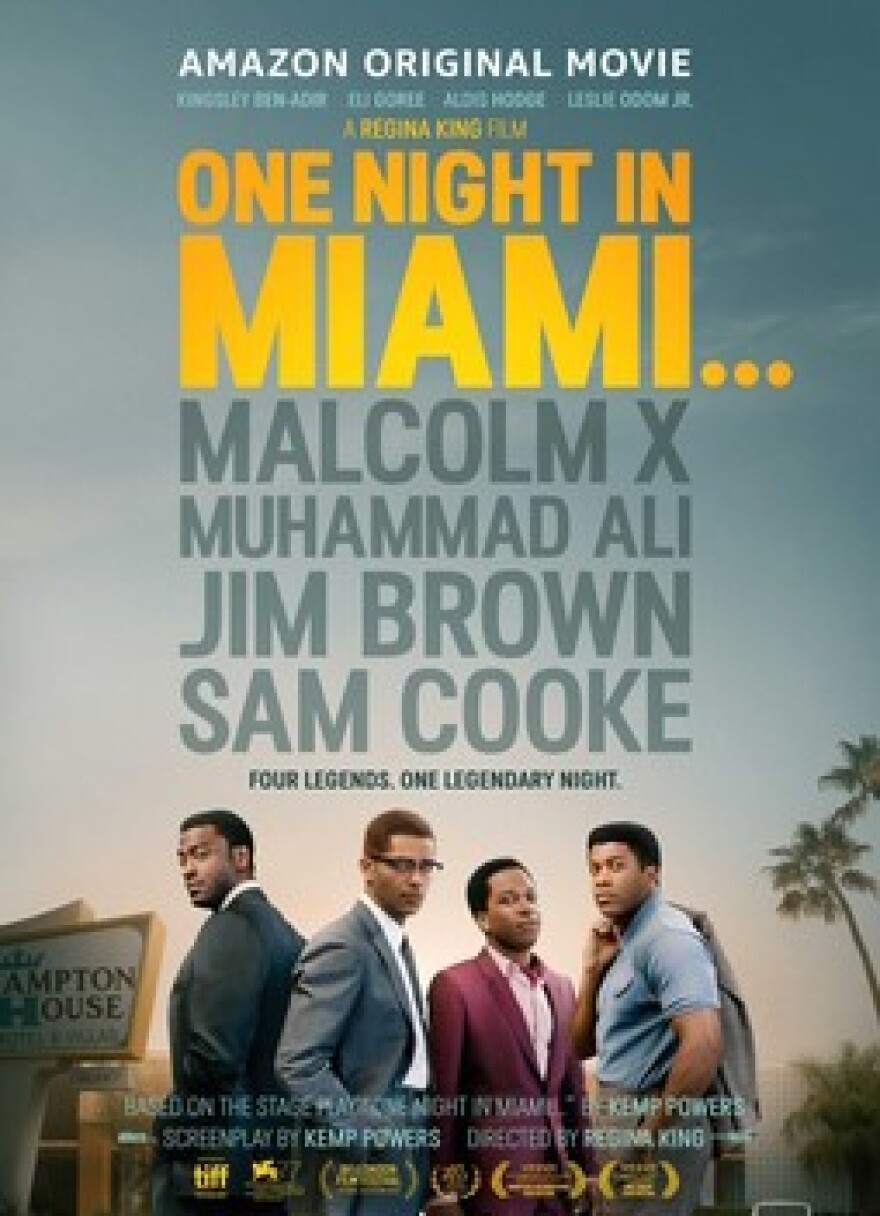Actress turned director Regina King’s One Night in Miami is a ‘what if’ fictional story about the night of Feb. 25, 1964 when 22-year-old Cassius Clay whups Sonny Liston for the Heavyweight championship of the world at the Convention Center in Miami.
The film had its premiere at the Toronto film festival last September and has just released on Amazon.
I was a kid lying in bed the night of the big fight, listening to Howard Cosell call it on a black and gold Zenith transistor radio, pulling for one Cassius Marcellus Clay to somehow beat the terrifying Sonny Liston, the defending champ who’d destroyed Floyd Patterson for the title in the first round two years earlier. The Olympics pretty boy was being fed into a cage of Black rage.
After Clay miraculously won in the 7th when Liston’s shoulder gave out, I bounced around my bedroom. Little did I realize that’s pretty much what Clay, Jim Brown and Sam Cooke would do as well, in Regina King’s direction of Kemp Power’s 2013 stage play.
The filmed play imagines a night when these young icons might have met thanks to Malcolm X, Clay’s heavyweight advisor in the spiritual dimension, and examined each other’s rationalizations in a white world. This is not history, it’s an imaginary lesson in community civics.
The three stars show up to party at the black motel where Malcolm has rented a room. Malcolm’s idea of party is to sit in the room, review their strategies and rationalizations and raise their consciousness beyond white groupies to black power. Brown would settle for white groupies and pork chops and is heading away from the NFL toward The Dirty Dozen and a film career. He has a shocking encounter with his momma’s old boss on a former white plantation in the film’s set up that sets the stage for all of them. Cooke wants to straight up party but is unhinged by the authentic voice of Bob Dylan’s Blowin’ in the Wind and Malcolm’s opinion that Cooke’s capitalist strategy makes him no better than an organ grinder’s monkey. Ouch. Clay has a victory devil screaming in his left ear and Malcolm whispering his new name, Muhammad Ali, and his new calling in his right ear. And Malcolm needs Clay’s conversion to convince the other two and the Black world at large of its own power.
A young Eli Goree, has Clay’s sense of fun and cadence down pretty well. Leslie Odom Jr., mesmerizing as Burr in Hamilton, practically steals the deal here as Sam Cooke, who is evolving toward writing and performing A Change Is Gonna Come and away from You Send Me before being murdered in a motel parking lot. Aldis Hodge has the inner confidence of Brown if not the full physical stature. Kingsley Ben-Adir doesn’t quite command enough Svengali as Malcolm to convince me that that a victory party is out of the question, Jim Crow be damned. Guys do sometimes just wanna have fun.

The real discussion in One Night in Miami—not unlike Ma Rainey’s Black Bottom, another if more finely honed film adaptation of a play—is to examine each of the ways in which black men rising in the world have compromised with white inducement to remain less powerful than they should be and at the expense of their own community. Malcolm has his own demons: He’s pursued by both the FBI and Elijah Muhammad, who in the film has him “guarded” by some very serious types.
The film lets us peer over Malcolm’s shoulder to see he finished his autobiography with Alex Haley. He was assassinated a year later. Regina King, who turned 50 last week, has divided her time between TV -- notably Southland and American Crime—and film, including early on Boyz in the Hood and most recently in Barry Jenkins’ adaptation of the James Baldwin novel, If Beale Street Could Talk, for which she won a supporting Oscar.
In King and Kemp’s One Night in Miami, the four horsemen of the apocalypse all Do The Right Thing: Four black men in a bare room are forced to take stock, while we wonder if we’ll ever go outside again.




